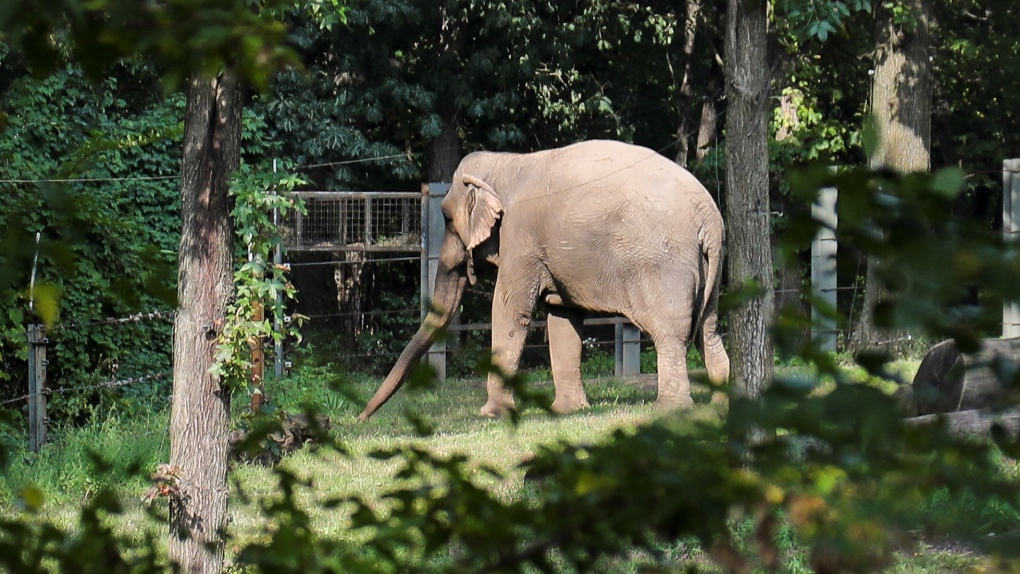ALBANY, N.Y. -
She has four limbs, expressive eyes and likes to stroll through greenery in New York City. Happy, by species, is an Asian elephant. But is she also a person?
That's the question before New York's highest court Wednesday in a closely watched case over whether a basic human right can be extended to an animal.
Her advocates at the Nonhuman Rights Project say yes: Happy is an autonomous, cognitively complex elephant worthy of the right reserved in law for "a person." The Bronx Zoo, where Happy resides, says no: Through an attorney, the zoo argues Happy is neither imprisoned nor a person, but a well-cared-for elephant "respected as the magnificent creature she is."
Happy has lived at the Bronx Zoo for 45 years. The state Court of Appeals is hearing arguments over whether she should be released through a habeas corpus proceeding, which is a way for people to challenge illegal confinement.
The Nonhuman Rights Project wants her moved from a "one-acre prison" at the zoo to a more spacious sanctuary.
"She has an interest in exercising her choices and deciding who she wants to be with, and where to go, and what to do, and what to eat," project attorney Monica Miller told The Associated Press. "And the zoo is prohibiting her from making any of those choices herself."
The group said that in 2005, Happy became the first elephant to pass a self-awareness indicator test, repeatedly touching a white "X" on her forehead as she looked into a large mirror.
The zoo and its supporters warn that a win for the advocates could open the door to more legal actions on behalf of animals, including pets and other species in zoos.
"If courts follow NRP's demand to grant animals personhood for habeas corpus purposes, elephants as well as other animals at every modern zoo in this country would have to be turned loose or transferred to the facility of NRP's choosing," Kenneth Manning, an attorney for zoo operator Wildlife Conservation Society, wrote in a court filing.
Happy was born in the wild in Asia in the early 1970s, captured and bought as a 1-year-old to the United States, where she was eventually named for one of the titular characters of "Snow White and the Seven Dwarfs." Happy arrived at the Bronx Zoo in 1977 with fellow elephant Grumpy, who was fatally injured in a 2002 confrontation with two other elephants.
Happy now lives in an enclosure adjacent to the zoo's other elephant, Patty. The zoo's attorney argued in court filings that Happy can swim, forage and engage in other behavior natural for elephants.
"The blatant exploitation of Happy the elephant by NRP to advance their coordinated agenda shows no concern for the individual animal and reveals the fact they are willing to sacrifice Happy's health and psychological well-being to set precedent," the zoo said in a prepared statement.
NRP's attorneys say no matter how Happy is being treated at the zoo, her right to "bodily liberty" is being violated. They argue that if the court recognizes Happy's right to that liberty under habeas corpus, she will be a "person" for that purpose. And then she must be released.
Lower courts have ruled against the NRP. And the group has failed to prevail in similar cases, including those involving a chimpanzee in upstate New York named Tommy.
But last October, at the urging of a different animal rights group, a federal judge ruled that Colombian drug kingpin Pablo Escobar's infamous "cocaine hippos" could be recognized as people or "interested persons" with legal rights in the U.S. The decision had no real ramifications for the hippos themselves, given that they reside in Colombia.
Opponents hope the NRP's string of court losses continues with the high-profile New York court.
In a friend-of-the-court brief, the New York Farm Bureau and other agriculture groups said the NRP's "new-fangled theory of personhood" would sweep up pigs, cows and chickens. The National Association for Biomedical Research said authorizing such petitions on behalf of animals could drive up the costs of conducting critical research. State and national associations representing veterinarians filed a brief saying NRP's lawsuit promotes animals' personhood rights above animals' welfare.
Supporters of NRP's action include public figures such as Harvard Law School professor Laurence Tribe. Many of them see this case as a chance for society to take a step forward in the ethical treatment of animals.
"We believe this legal moment for Happy represents a key cultural crossroads for thinking more openly and honestly--and less selfishly--about what it would mean to treat the particularity of non-human animals with the moral seriousness it deserves," a brief submitted by Catholic academic theologians read.
The court's decision is expected in the coming months.
At least one animal rights advocate suggests a lone court decision won't change society's view of animal use. Rutgers Law School professor Gary Francione, who is not involved in the case, said that would require a broader cultural shift.
"I've been a vegan for 40 years. Don't get me wrong, I disagree with animal use altogether," Francione said. "Just to have the court start saying that non-human animals are persons under the law is going to raise all sorts of questions, the answers to which are not going to be amenable to many people."








































